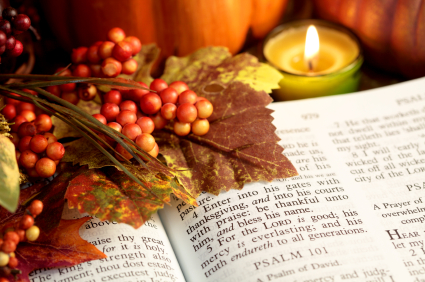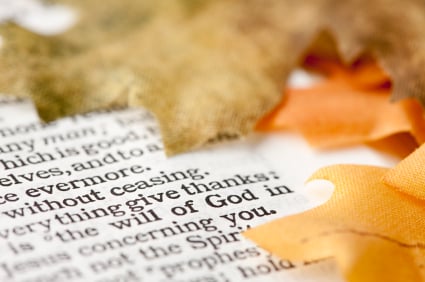Devotions From the Thanksgiving Archives

Do you need encouragement this Thanksgiving season? The following devotions and teachings from the Thanksgiving archives provide helpful insight and encouragement for this and every season year round:
- Daily Thanksgiving: A Sacrifice of Praise
- A Reason to Give Thanks, Even in Hard Times
- Finding Contentment and Thanksgiving in Suffering, Part One
- Finding Contentment and Thanksgiving in Suffering, Part Two
Daily Thanksgiving: A Sacrifice of Praise
Do you want to be near to God—aware of His presence? As we draw near to Him, there is one thing we are instructed to do: enter His gates with thanksgiving!
“Enter his gates with thanksgiving and his courts with praise; give thanks to him and praise his name.
For the LORD is good and his love endures forever; his faithfulness continues through all generations” (Psalm 100:4-5).
I’m a type A perfectionist. By nature, my mind zeroes in on the flaws in life. I may have worked tirelessly on a project and completed it with excellence — 99.9% perfect. But all I can see is the .1% that’s imperfect. It doesn’t matter what I’m viewing—a work of art or a freshly made up bed. My mind’s eye immediately (and only) sees the flaws! So when I wake up every morning, my fleshly nature zeroes in on all that is wrong with my world. This makes me, by nature, a complainer. It takes discipline for me to give thanks.
Scripture doesn’t say, “Enter his courts with complaining.” (Ouch!) No, we enter His presence giving Him thanks and praise! This is something we are instructed to do continually. Why?
Old Testament Sacrifice
Under the Old Covenant, Israel held an annual day of atonement. On this day, the people were cleansed from all the sins that had accumulated during the past year. The atonement was accomplished through a priestly sacrifice.
Two young goats (often called “calves”) were taken to the gate of the tabernacle and presented to the high priest as a sacrifice. One of the goats, chosen by lot, was to be the blood sacrifice. A scarlet cloth was wrapped around its neck to mark it for sacrificing. The other goat was designated as a scapegoat and kept outside the holy place.
The first goat was taken to the altar and slain. Its blood was collected in a bowl. The priest took the blood into the holy of holies. There he presented it with incense. As the incense burned, it filled the holy of holies with smoke representing the presence of God. Then the priest sprinkled the blood on the mercy seat once, and in front of it seven times.
Outside, every person in the camp lay prostrate. No one saw this as it happened. Yet the ritual meant that atonement was being made for their sins. Their transgressions for the whole year were being forgiven.
The next part of the ceremony was visible—an illustrated sermon for every Israelite to see.
The high priest emerged from the holy place and laid both his hands on the head of the remaining scapegoat. (The Hebrew word for “scapegoat” means “removal.”) The priest’s act of laying hands on the scapegoat symbolized the transferring of all the people’s sins to the head of the animal:
“He will lay both of his hands on the goat’s head and confess over it all the wickedness, rebellion, and sins of the people of Israel. In this way, he will transfer the people’s sins to the head of the goat. Then a man specially chosen for the task will drive the goat into the wilderness. (Leviticus 16:21-22, NLT).
As the priest laid hands on the scapegoat, he confessed the sins of the whole camp. He essentially prayed: “Lord, place my sins and the sins of the people on the head of this goat. Now, depart!”
The specially chosen man then put a leash on the scapegoat and led him out of the camp. The people of Israel stood watching and rejoicing as the scapegoat was led away. It was an illustrated sermon that everyone could understand: “Not only are our sins forgiven—but they are taken away from our midst!”
The people knew that as that goat was led out of their midst, he would never be seen again. And neither would the Lord remember their sins. A mighty shout went up from the camp!
New Testament Sacrifice
This is a beautiful picture of what Jesus Christ does for us. Both of the goats represent Jesus—the lamb who was slain for us, and the one who took away the sins of the world….
A Reason to Give Thanks, Even in Hard Times
This Thanksgiving Day, amid financial hardships, tragedies, and crises so prevalent in our nation and around the world, we tend to be preoccupied by all of the negative and challenging circumstances of our lives.
As this thought crossed my mind today, the Holy Spirit brought a simple verse to mind:
“Be at rest once more, O my soul, for the LORD has been good to you” (Psalm 116:7).
No doubt you are experiencing trials of one kind of another. Such is the nature of living in a fallen world. But we have reason to be at rest on this special day—God has been good to us! He has been good to us as a nation. He has been good to each one of us individually. You and I have overwhelming evidence of His loving heart and guiding hand. Let us do today as the Psalmist suggested in this chapter:
“I will sacrifice at thank offering to you and call on the name of the LORD” (Psalm 116:7).
Be at rest—God has been good to you, and will be good to you. Everything is going to be okay. May we put our requests aside for one whole day and dedicate the entire day to simply giving thanks….
Did you know that suffering can be an occasion for gratitude? Without the eyes of faith, this may seem insane. But looking through God’s eyes of eternity, it is not only possible, it’s logical.
In When God Weeps, Joni E. Tada defines suffering as “having what you don’t want and wanting what you don’t have.” Defined by these terms, everyone is suffering in some way. Even you. Therefore, you might find it very hard to be thankful today. But it is possible for your suffering to be an occasion for gratitude and thanksgiving. (Tweet this)
Greatest Gift
The time I was the most content and the most thankful in my life was the season in which I experienced the most suffering.
It happened in the middle of my captivity of sorts. All total, I spent ten years in a wheelchair, seven years confined to bed and three years in severe mental torture. As the Lyme bacteria affected my brain, I began to feel electrocuted or burned alive … but where one feels thoughts. It was excruciating—more excruciating than the sum total of bodily pain and sickness I had endured over the years thus far! I had been confined to wheelchair and to bed, but it was nothing compared to this.
When the neurological torture began in July 1995, I thought it would be an absolute miracle of God if He helped me make it an entire week to my next doctor appointment, where I presumed (wrongly) I would be cured. Yet … three years later, I remained in the exact same shape. I wailed and screamed bloody murder from the physical agony for those three years, living much of the time on the floor, near baseboards, in dark closets.
If ever I thought I was in an “I can’t take it” scenario, this was it. And I let God know! I wanted out. I didn’t want to wake up, didn’t want to be alive, didn’t want to endure any more torture. It wasn’t that I necessarily wanted to die; I just wanted relief. There was no known medical treatment that would help. For three years my family exhausted all the United States and other countries had to offer … all to no avail.
But you know what? Looking back, those three years of seemingly unbearable moments taught me where true joy resides. God taught me that I had something valuable to be thankful for. In fact, it was the most invaluable gift a person could ever receive. And I had it not in spite of my suffering … but because of it. (Tweet this)
The Address Where Joy Lives
I discovered where true joy resides. It doesn’t reside in real estate, or a bank account, or bodily abilities and comfort. True joy is found only one place:
“You will fill me with joy in your presence, with eternal pleasures at
your right hand” (Psalm 16:11).
True joy, true pleasure, is found only in God’s presence—not in material possessions, not in health, not in a good-paying job, not in a spouse, and not in the success of your children. (Tweet this)
Only in Christ and the experience of His life living for us can we find true happiness. Suffering should escort us to the foot of the cross where we exchange our life for His resurrection power. When we suffer, we become one with Christ in His sufferings. He takes on our flesh and we take on His holiness (see Hebrews 12:5-11). This is the great exchange! We die so that he might live through us. (Tweet this)
The riches of Jesus Christ that we receive in return for our old self far exceed the spiritual poverty in which we lived before….
It is possible to find contentment and thanksgiving in our suffering because of Jesus Christ. Knowing Him more fully is the greatest gift we could ever receive. But it often takes experiences of suffering for us to pursue Him, depend on Him, cling to Him—and come to know Him more fully. For that reason, suffering is a blessing.
Is Suffering Actually A Blessing?
We usually reserve the word “blessing” for those things that bring us pleasure in the temporal realm. But it is only in suffering that we learn to identify with Christ and His suffering on the cross for us. It is often only in suffering that the hold the world and our natural man have over us is shattered. It is often only in suffering that we see what is actually real and lasting. . . . .
Christ is our real life. Without the presence of suffering, we would accept the illusion, the deception, that the temporal world is what is real. Without discomfort, we tend to shuffle along, eyes to the ground. We don’t look up! … When we look up, we see that everything in God’s economy is upside down compared to ours. Grace turns everything upside down. …
We are accustomed to defining a blessing according to the temporal realm. We equate what is victorious in the flesh with what is victorious in the Spirit. And in so doing, we deny that victory in the spirit comes through crucifixion of the flesh. Yes, grace turns everything upside down … even suffering. (Tweet this)
When I was sick and confined to the house, I watched a lot of Christian television. One year, prior to an NFL division playoff game, I saw interviews of Christian players from both teams. The players from both teams thanked God for the blessing of competing in the playoff game, as the winning team would compete in the Super Bowl.
“God is so good! This is such a blessing to have the chance to go to the Super Bowl,” one player said.
“I can’t believe God’s goodness,” another player said. “What a blessing to be here in the playoff game!”
Players from both teams acknowledged God’s blessing on their lives and their teams. Then … one team inevitably lost. As the Christian players on the winning team were interviewed, they of course thanked God.
“Wow! What a blessing! We get to go to the Super Bowl!” one player exclaimed.
“God has truly blessed us,” another player said. “I never imagined He would allow me to play in the Super Bowl.”
Lying there in my mid-20’s, my life suddenly halted by an illness that had imprisoned me in a wheelchair, in my body and ultimately in my mind, I felt a bit like a player who’d lost the game. I couldn’t help but empathize with the players who lost the playoff game. Were they not blessed too? Was the plan of God not at work in their lives also?
Yes, they were all blessed! Both sides—winners and losers—were blessed. We don’t think of the losing team as blessed because we’re accustomed to defining a blessing according to the temporal realm.
Victories, triumphs and abundance aren’t the only forms in which blessings arrive. God uses all types of paper to wrap the gifts of His blessings to us.
Wrapping Paper vs. The Gift
The wrapping paper or gift bag—the presentation of the blessing—isn’t the important part. What’s important is the gift inside! The actual gift.
Let’s suppose that this Christmas you have a gift under the tree wrapped in gorgeous, expensive looking paper. No matter how beautifully it’s wrapped, it would seem a bit crazy for you to carefully remove the paper, put it in a treasure box, and throw the gift away. What if the gift was a diamond ring … or the keys to a new car?
It’s insane to mistake the wrapping for the gift … but we do it all the time.
Sometimes when I speak and tell my story, I will try to give someone in the audience a gift. They never want to take it, though. That’s because there’s a catch. It’s not really a gift, or so it appears. What I am trying to hand them is a ball of trash—old newspapers, grocery bags, dirty Kleenexes—bound together with thorny vines. Not only is it ugly and dirty … it’s painful, inflicting discomfort at the slightest encounter.
No one ever wants my treasure. It appears like trash to them (and judging from the exterior alone, it is).
“One man’s trash is another man’s treasure,” I say as I begin carefully peeling away the “wrapping paper.” It takes time and great care to remove the thorns without hurting my fingers, but it can be done—slowly … with patience.
After a few moments, the gleam of a gold jewelry box begins to emerge from within the ball of thorny trash. The audience collectively gasps and begins to realize they misjudged my treasure.
Gradually, with a little more careful removal of the wrapping, I slip the jewelry box out of the glob of trash and open it to reveal what’s inside—the treasure they would have thrown away. So what’s inside? A $5000 gold, diamond ring.
In the same way, we shouldn’t be quick to judge our circumstances based solely upon appearance. If we do, we could resent or even discard the most invaluable gift we could ever receive—that of knowing Jesus Christ more intimately.
There is treasure within your suffering today. Your trials and afflictions are merely the wrapping paper concealing it. (Tweet this)

Disclosure of Material Connection: Some of the links in the post above are “affiliate links.” This means if you click on the link and purchase the item, Shades of Grace will receive an affiliate commission. Regardless, I only recommend products or services I use personally and believe will add value to my readers. I am disclosing this in accordance with the Federal Trade Commission’s 16 CFR, Part 255 “Guides Concerning the Use of Endorsements and Testimonials in Advertising.”









 “Natalie Grace Nichols is experiencing God’s grace and freely expressing it. My wife, Betty, and I thank God for the ministry of Jesus through Natalie.”
“Natalie Grace Nichols is experiencing God’s grace and freely expressing it. My wife, Betty, and I thank God for the ministry of Jesus through Natalie.” “I’m so thankful that God is raising up women like Natalie for a new generation, providing biblically balanced teaching, encouragement, and comfort for people who are enduring life’s trials.”
“I’m so thankful that God is raising up women like Natalie for a new generation, providing biblically balanced teaching, encouragement, and comfort for people who are enduring life’s trials.”